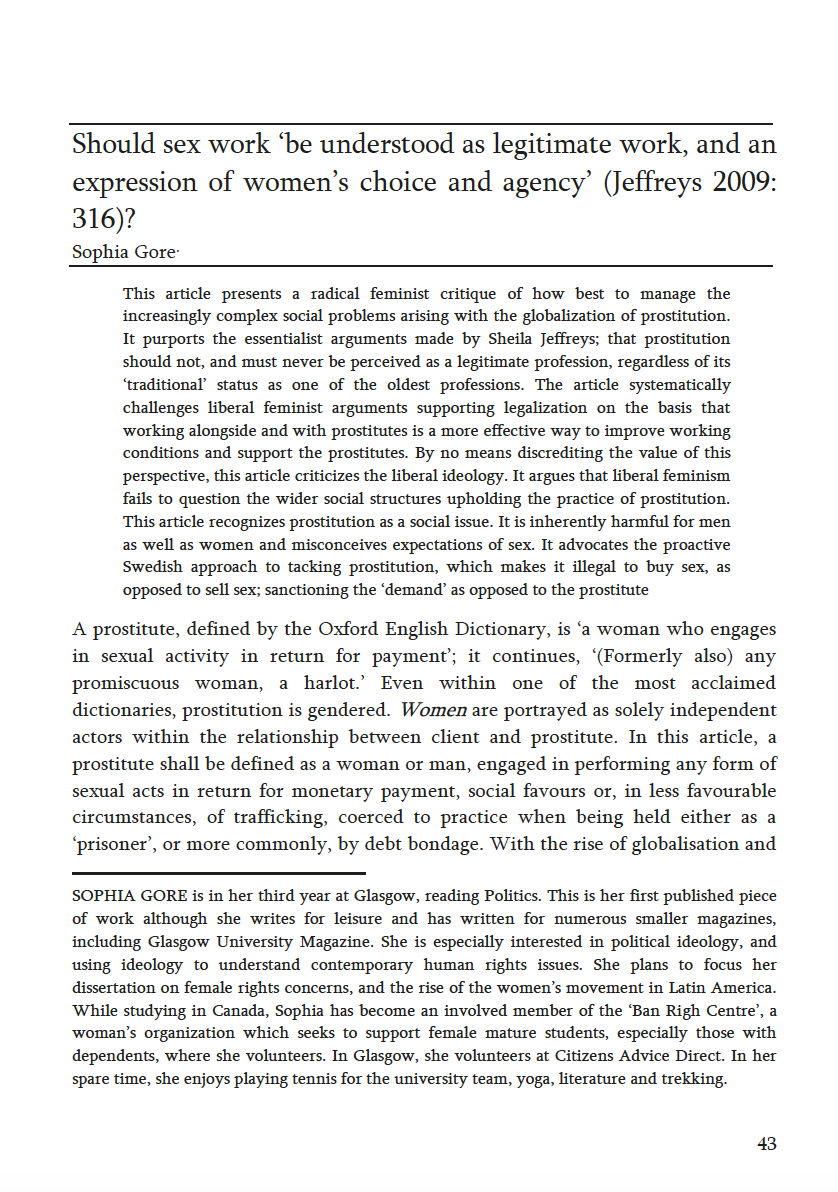Should sex work 'be understood as legitimate work, and an expression of women's choice and agency‟ (Jeffreys 2009: 316)?
DOI:
https://doi.org/10.36399/GroundingsUG.7.217Keywords:
Prostitution, Globalization, Jeffreys, Legitimization, Legalization, Critique, Liberal Feminism, Social Structures, Swedish ApproachAbstract
This article presents a radical feminist critique of how best to manage the increasingly complex social problems arising with the globalization of prostitution. It purports the essentialist arguments made by Sheila Jeffreys; that prostitution should not, and must never be perceived as a legitimate profession, regardless of its 'traditional' status as one of the oldest professions. The article systematically challenges liberal feminist arguments supporting legalization on the basis that working alongside and with prostitutes is a more effective way to improve working conditions and support the prostitutes. By no means discrediting the value of this perspective, this article criticizes the liberal ideology. It argues that liberal feminism fails to question the wider social structures upholding the practice of prostitution. This article recognizes prostitution as a social issue. It is inherently harmful for men as well as women and misconceives expectations of sex. It advocates the proactive Swedish approach to tacking prostitution, which makes it illegal to buy sex, as opposed to sell sex; sanctioning the 'demand' as opposed to the prostitute.
References
Adams, N. 2003. Anti-Trafficking Legislation: Protection or Deportation?. Feminist Review, No. 73, Exile and Asylum: Women Seeking Refuge in 'fortress Europe', 135-139.
Agha, S. and Nchima, M, C. 2004. Life-Circumstances, Working Conditions and HIV Risk among Street and Nightclub-Based Sex Workers in Lusaka, Zambia. Culture, Health and Sexuality, Vol. 6, No. 4, 283-299.
Anderson, S, A., 2002. Prostitution and Sexual Autonomy: Making Sense of the Prohibition of Prostitution. Ethics, Vol. 112, 748-780.
Brison, S. 2006. Contentious Freedom: Sex Work and Social Construction. Hepatia, Vol. 21, 192-200.
Ditmore, M., 2008. Sex work, trafficking and HIV: how development is compromising sex workers' human rights. In Cornwall, A. et al (eds) Development with a Body: Sexuality, Human Rights and Development, London: Zed, 54-66.
Djordjevic, J. 2008. Social and Political inclusion as sex workers as a preventative measure against trafficking: Serbian experiences. In: Cornwall, A., Correêa, S., Jolly, S., Development with a body: Sexuality, Human Rights and Development, London: Zed, 161-181.
Jeffreys, S. 2009. 'Prostitution, trafficking and feminism: An update on the debate' Women's Studies International Forum 32, 316–320.
Jennes, V. 1990. 'From Sex as Sin to Sex as Work: COYOTE and the Reorganization of Prostitution as a Social Problem'. Social problems. Vol. 37, No. 3, 403-420.
Kilvington, J., Day, S., Ward, H., 2001. Prostitution Policy in Europe: A Time of Change?. Feminist Review; Sex Work Reassessed, Vol. 67, 78-93.
Miriam, K., 2005. Stopping the Traffic in Women: Power, Agency and Abolition in Feminist Debates over Sex-Trafficking. Journal of Social Philosophy, Vol. 36, 1-17.
O'Connell Davidson, J., 2002. The Rights and Wrongs of Prostitution. Hepatia: Feminist Philosophies of Love and Work, Vol. 17, 84-98.
Remote Sensing. 2001. [Documentary] Switzerland: Ursula Biemann. Available: <http://www.cultureunplugged.com/documentary/watch-online/play/11270> [Accessed: 17.11.13].
Sullivan, M., 2005. What Happens When Prostitution Becomes Work? An Update on Legalisation of Prostitution in Australia. Coalition Against Trafficking in Women, Australia. Available:<http://www.catwinternational.org/Content/Images/Article/93/attachment.pdf> [Accessed: 9.12.13].
Weitzer, R., 2009. Sociology of Sex Work. Annual Review of Sociology, Vol. 35, 213-234.

Downloads
Published
Issue
Section
License
Copyright (c) 2015 Sophia Gore

This work is licensed under a Creative Commons Attribution 4.0 International License.
The CC BY 4.0 license is a Creative Commons license. This is a non-copyleft free license that is good for art and entertainment works, and educational works. It is compatible with all versions of the GNU GPL; however, like all CC licenses, it should not be used on software. People are free to: Share — copy and redistribute the material in any medium or format; Adapt — remix, transform, and build upon the material for any purpose, even commercially. The licensor cannot revoke these freedoms as long as you follow the license terms. But they must conform to the following terms: Attribution — You must give appropriate credit, provide a link to the license, and indicate if changes were made. You may do so in any reasonable manner, but not in any way that suggests the licensor endorses you or your use. No additional restrictions — You may not apply legal terms or technological measures that legally restrict others from doing anything the license permits.
Please check individual article PDF copies to see if any additional restrictions apply.







